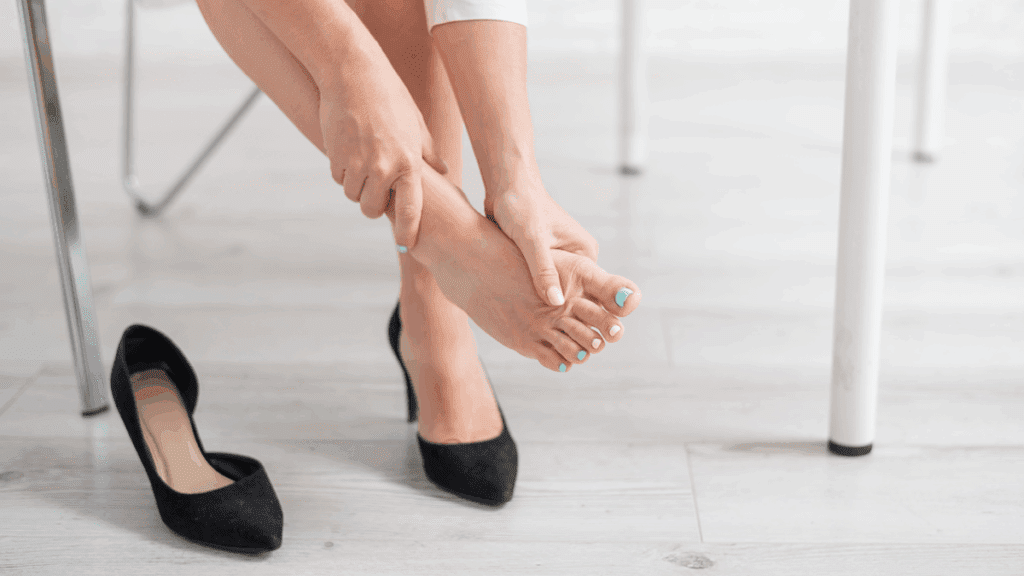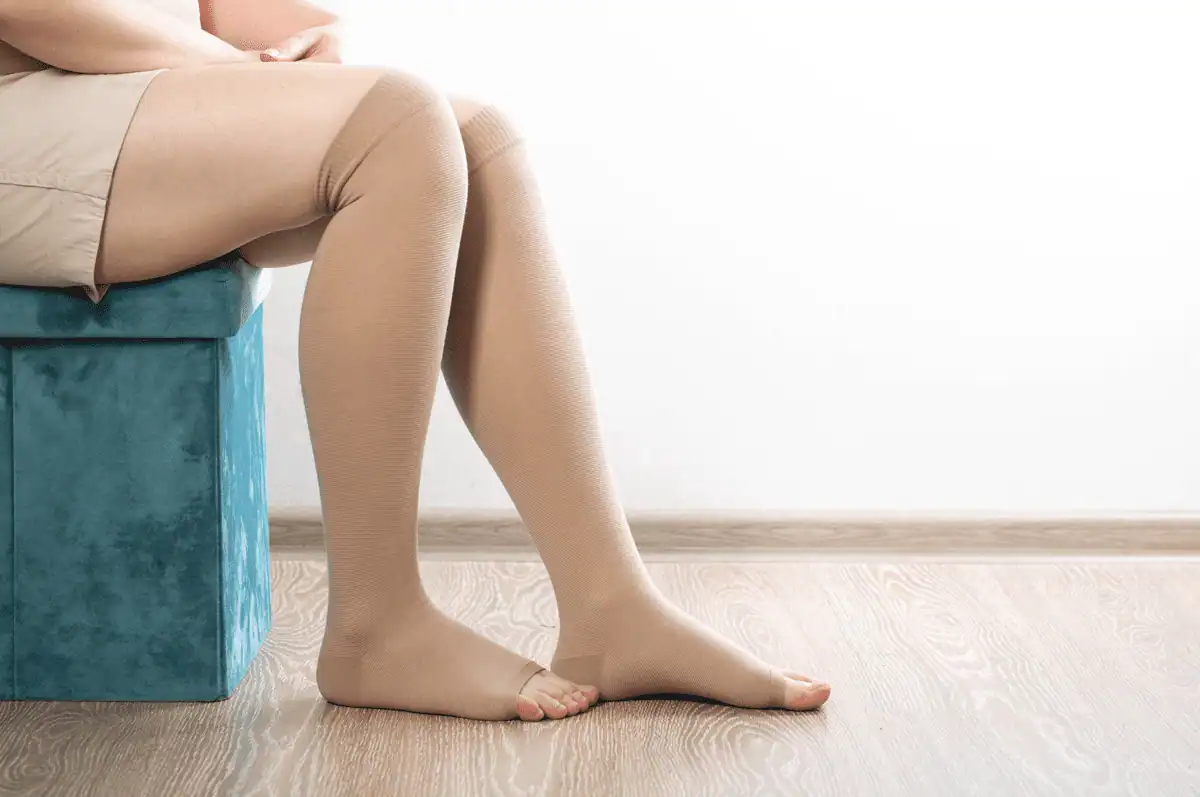If your legs feel heavy, you’re not alone. People describe it as dragging, tired, or weighed down, especially after a long day on their feet or after hours of sitting. Sometimes the feeling eases with rest, elevation, or a short walk. Other times, it keeps coming back and starts affecting sleep, exercise, or work. When you catch yourself asking, “Why do my legs feel heavy?”, it’s worth looking at common medical causes and what to do next.
4 Medical Reasons Why Your Legs Feel Heavy
Below are four frequent reasons heavy legs show up, how they typically feel, and when to see a specialist.
1) Venous Valve Reflux (Chronic Venous Insufficiency)
When the valves inside the leg veins weaken, blood can pool in the lower legs (chronic venous insufficiency, or CVI). Pooling raises pressure in the veins and leads to aching, ankle swelling, nighttime leg cramps, itching near the ankles, and that end-of-day “cement block” sensation. Visible varicose or spider veins can appear, but venous problems can exist even without them.
Signs it could be venous:
- Legs feel heavy and achy by late afternoon, better after elevating the feet.
- Swelling that’s mild in the morning and worse in the evening.
- Itching or skin discoloration near the ankles.
How we help: In-office duplex ultrasound to confirm reflux, followed by a plan that starts with activity changes, elevation, and properly fitted medical-grade compression. When indicated, we offer minimally invasive treatment (see below).
2) Symptomatic Varicose and Spider Veins
Bulging tributary veins and dense spider vein networks can reflect underlying reflux, contributing to aching and the sense that legs feel heavy by day’s end.
How we help: Targeted treatment of symptomatic surface veins to reduce pressure and discomfort.
3) Deep Vein Thrombosis (DVT)
A DVT is a clot in a deep leg vein. It can cause sudden heaviness, tightness, or pain, often with swelling, warmth, or redness, usually in one leg.
What to do now: If you develop new one-sided leg swelling or pain; skin warmth or color change; or chest pain or shortness of breath, seek urgent care. After emergency evaluation, we coordinate follow-up venous ultrasound and manage ongoing vein health to reduce persistent heaviness.
4) Lifestyle and Hormonal Factors That Worsen Venous Pooling
Sometimes the answer to “why do my legs feel heavy and tired” is a mix of daily factors that strain your veins: long periods of standing or sitting, ramping up a new workout without recovery, heat and humidity, certain medications or hormones, pregnancy, or weight changes.
How we help: We recommend simple routines you can start today: movement breaks and calf-pump exercises, timed elevation, hydration and salt awareness, supportive footwear, and compression when needed.
Heavy vs. Weak Legs: A Quick Self-Check
Patients often ask, “Why do my legs feel heavy and weak?” Heaviness is a sensation of effort, like trudging through sand. Weakness is a loss of actual strength, such as difficulty rising from a chair or climbing stairs. If you notice true weakness, sudden asymmetry, or changes in bowel or bladder control, get prompt care.
What to Do When My Legs Feel Heavy: Immediate Relief Tips
While you arrange an evaluation, these steps are safe for most people and can help when your legs feel heavy:
- Move every hour: Calf pumps, ankle circles, and short walks support blood flow.
- Elevate when resting: Feet above heart level for 15–20 minutes helps fluid return.
- Compression socks: Graduated compression can reduce pooling if venous issues are suspected. If you have PAD or think you might, talk with a clinician first.
- Hydration and salt awareness: Adequate fluids and mindful sodium intake help regulate fluid balance.
- Supportive footwear: Stable shoes reduce fatigue on long days.
- Healthy routines: Regular activity, weight management, and sleep all help.
If the problem keeps returning, if you find yourself saying, “my legs feel heavy” most days, or if you’re seeing swelling, skin changes, or visible veins, schedule a medical assessment.

Heavy Leg Vein Treatment Options
Because venous disease is a leading answer to why do my legs feel heavy, a vein-focused exam is a strong starting point:
- Targeted history and exam: We look for patterns, such as heaviness worse in the evening, swelling around the ankles, or nighttime leg cramps.
- Duplex ultrasound: This noninvasive test maps blood flow, checks for valve reflux or blockages, and guides a precise plan.
- Conservative care first: Lifestyle strategies, compression (when appropriate), and movement plans are introduced early.
Minimally invasive treatments when needed:
- Endovenous ablation (radiofrequency or laser) closes refluxing veins from the inside; it’s an outpatient procedure typically done with local anesthesia.
- VenaSeal™ closure is a medical adhesive that is delivered through a small catheter to seal the diseased vein; no tumescent anesthesia is required.
- Ambulatory phlebectomy removes bulging surface veins through tiny entry points, usually under local anesthesia in the office.
- Sclerotherapy treats small varicose and spider veins.
Patients often report that their legs feel less heavy often within weeks of addressing the underlying venous issue.
When Heavy Legs Signal an Emergency
- Sudden leg swelling, warmth, redness, or pain in one leg.
- Chest pain, shortness of breath, or coughing up blood.
- New, severe weakness, numbness, or loss of bladder or bowel control.
Find the Cause of Heavy Legs Today
If your legs feel heavy most days, write down when it happens, what helps or makes it worse, and any swelling or skin changes you notice. The question “Why do my legs feel heavy?” has real answers. Many causes are treatable with the right plan. Vein Institute evaluates and treats venous causes of heavy legs every day. If your legs feel heavy and weak, or you’re asking, “Why do my legs feel heavy and tired?”, Contact us today. We’ll check your circulation, explain your options, and help you get moving again.

